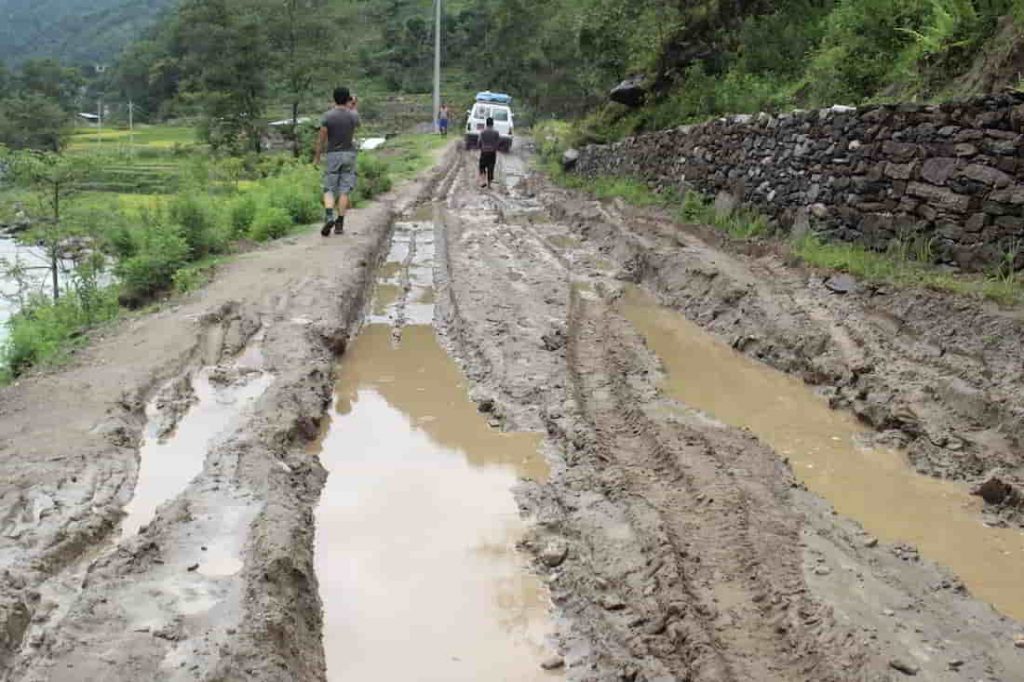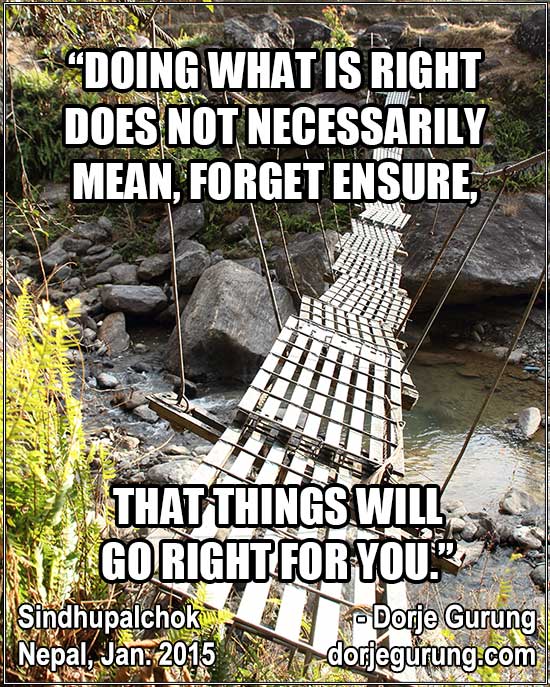To me, NOW, it feels kind of wild to be ABLE to recall and look back at the unjust and most traumatic experience of my life that transpired eleven years ago in Doha, Qatar as something that happened a long time ago. I say that because that had NOT been the case for quite some time, not until just three years ago!
Not long after returning to Nepal in May 2013 soon after the twelve-day experience in police custody in Al Rayyan Police station for allegedly insulting Islam, not surprisingly, I started feeling itchy in my feet, figuratively speaking of course. After all, I had returned to the country after spending most of my itinerant adult life abroad–studying and working in ten different countries for almost twenty-five years. If there had been one constant in my life between 1988 and 2013, it had been movement, change. The longest continuous stay in any one country, during that entire period, had been just three years and only in two countries at that!
But, I had returned home to give living and working here a try and to do, among other things, what I could to help children from socio-economic background like mine. More importantly though, I had returned to change–to do something completely different.
I had been an international Chemistry/Science teacher during my entire professional career up to that point, living in an expat bubble around the world.
I had had a life of fully furnished apartments with utilities, travel allowance, health insurance with worldwide coverage and 150-dollar brunches; a life of teaching generally motivated and dedicated students from around the world, students with little or no discipline problems; a life of teaching with a lot of freedom to teach as I pleased; a life of work with and life among highly qualified, nomadic international friends and colleagues; a life of wild life safaris (in Malawi, Zambia, Tanzania, Nepal); a life of extremely fun leisure activities, such as scuba diving (in The Philippines, Zanzibar), skiing (in Switzerland, USA, Georgia), hot air ballooning (in Australia), swimming with wild dolphins (in Zanzibar) etc.; a life of hiking/trekking in and visiting natural wonders (the Grand Canyon, Cooks Canyon, Ayers Rock, the Mekong Delta, Ngorongoro Crater etc.); a life of vacations on sandy white tropical beaches around the world (Sri Lanka, Philippines, Indonesia, Zanzibar, Cuba etc.); a life of vacations to exotic locations (Australia, Ireland, California, Zanzibar); a life of learning about other cultures and people and challenging myself, and, equally importantly, learning about and discovering myself etc. etc. etc.
Back in Nepal, I had begun a new career as a social worker, as the Education Program Director at COMMITTED, a non-profit founded and run by Jayjeev Hada, a Xaverian classmate. I had joined COMMITTED because of what it was doing, how it was doing, and Jayjeev’s general philosophy, goals, and the way he worked.
One of the the ways he and COMMITTED worked, for example, was to ensure that as much of every dollar the organization got benefited, directly or indirectly, the students and organizations they sought to serve. A number of policies and practices were in place to minimize costs and expenditures on our own selves–the staff and employees–and on the organization.
The first couple of years I was at COMMITTED, we were an organization with a budget about a third of the combined salaries and benefits the three of us–Jayjeev and his wife, in the US, and I, in some exotic country hardly anyone has heard of–would have enjoyed. Forget about thousands of dollars in salaries for ourselves, for a few years, we didn’t even provide any benefits to any of us–no housing allowance, no health/life insurance, no dental plans, no pension scheme (retirement benefits) etc. In my case, the first three years, I didn’t even pay a salary to myself!
Our organization’s overhead, even with office space and a staff of six at the time, could easily have been less than the yearly educational cost of a student at many of the international schools I had taught!
Transportation was another area we minimized our expenses on. Unless it was absolutely necessary, when making site visits, we took public transportation–usually a local bus. We would only hire a 4×4 Toyota Land Cruiser and travel in relative comfort when we had to transport materials we couldn’t in a bus, no different from when I first visited Thangpalkot with Jayjeev. While a bus costs about Rs. 140/person (about US$1.50 then), a land cruiser set us back more than Rs. 10,000 (US$100), each way! Forget about 150-dollar brunches and expensive leisure activities on beaches around the world.

During the monsoon season (the summer), however, landslides and erosion would often eliminate the vehicular option from Melamchi onwards! We would then end up having to walk, a fair distance as well. Luckily, Jayjeev and I love walking in the countryside! 🙂 In other words, when people talked about and “praised” local non-profits being “on the ground” we were.
We walked the terrains–taking the paths the locals did. We hiked the hills, forded the rivers, and crossed rickety bridges to get to the communities we worked with. Once on such a bridge (see image below), I slipped but was able to prevent myself from falling. Who knows what would have happened had I fallen. (That incident, incidentally, was one of the inspiration behind the meme.)

I slipped and gave me a major scare.
At the project site itself, we endeavored to keep our expenses to a minimum, staying in local lodges without even signage identifying itself as one and providing just the most basic amenities. We ate and drank where and what the community members ate and drank, nothing special. For the longest time, COMMITTED didn’t even provide per diems to any staff. Per diems, I have been told, is the norm with most non-profit organizations. COMMITTED paid for only room and board to its employees when making site visits.
Alcohol, for example, was at one’s own expense. Firstly because it is considerably more expensive than everything else, and secondly–and more importantly–it’s a luxury and a choice. When Jayjeev and I made our visits, often our alcohol expenses, of course, amounted to considerably more than everything else combined!
We also minimized our expenses for the organization, relying on, again, donations. COMMITTED didn’t even have a desktop to its name for a long time, for example, forget laptops, printers etc. For the first couple of years I was there, everyone used either Jayjeev’s old laptops or, in my case, my own. Those were finally replaced by old laptops and printers donated by an INGO. It wasn’t until around the beginning of 2018 that a donor provided funding for some staff laptops!
All that firstly, because, I always believed in being on the ground and being directly involved to have maximum impact. Secondly, so that our students–the government school students we sought to serve–received, directly or indirectly, the benefits of as much of every dollar donated to us as possible. Those were, after all, students whose educational costs per year was about equivalent to what I used to spend going out on a weekend or on a Sunday brunch in Qatar.
It was for the same reasons that when I started working at COMMITTED by fundraising for a few different projects in June 2013, raising a little over USD31K, I didn’t feel it right to pay myself any kind of salary or repurpose significant amount of the funds to anything else other than that which it was meant for.
And yet, from not long after arriving in Nepal, my reflection in mirror above my bathroom sink staring at me in the morning asked me, from time to time,”What are you doing?” The questioning got more “intense” about fifteen months into my stay in the country.
In the blog post commemorating a year of freedom, I wrote,”[B]ringing changes has been and will continue to be very very challenging–exciting and frustrating in different measures at different times.”
One of the challenges was ignoring the prevalent negative views about and attitudes towards non-profits (NGOs) in Nepal and towards their directors and/or founders. From time to time, even those who know me and are acquainted with me, I could tell, would confront me with that, forget about them promoting and amplifying what I was saying I was doing to address issues the country was facing through our work.
Another challenge was fighting against the very staunchly ingrained dependency culture and the kind of attitudes, beliefs, and “understanding” of development aid it had spawned.
Yet another, and kind of related to that, was the beneficiaries of our assistance doubting our intentions and, worse, believing that we had some sort of a hidden agenda or that we were raking in the bucks and we were really doing all that did for money. Non-profits in Nepal had the general reputation of being a cash cow…for the founders/owners and/or top officials.
Still another was my own struggles with “selling pain and poverty” to raise funds for our work. In time, I realized doing that was adversely affecting me personally–it was partly hindering me from recovering from my traumatic experience.
In 2018, I discovered I was continuing to struggle gravely in many additional ways–personally, socially, emotionally, and intellectually. There was my struggles with the deep sense I carried of being wronged for no reason, for example. Above all else, however, was the unsettling discovery I had made about how, when I felt I had been rendered utterly powerless, I offered to compromise my identity–well, at least who and what I had always thought and believed I was and chose to abandoned reason–for just the glimmer of hope that doing so might somehow, against all odds, contribute even in the tiniest bit towards a path to freedom. That had inflicted a major dent in the respect I had for myself and how I had viewed and thought of myself, among other things. The details of that, however, I have yet to make public.
I realized what I needed was change! I needed to live life differently and do different things to reorient and re-center myself–as it were–in as many different ways as was possible.
So, in a deliberate effort to try to put myself on a path to recovery from the deep and grave wounds the major injustice in Qatar had inflicted in me, one of the important things I did, in June 2018, was to quit COMMITTED. By that time, I had already introduced changes to my life–mainly social life–at different times. In the few years that followed, I made changes to–or introduced changes into–my life, one after another. Then, finally, in September 2021, in the midst of the coronavirus pandemic, I finally felt I was truly on a path to recovery. Today, eleven years since the incident, I can say I have recovered!
